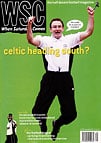 The Old Firm's proposal to join the Premier League
The Old Firm's proposal to join the Premier League
Ten years ago this summer, the FA published its Blueprint for Football, which first made explicit its support for the breakaway Premier League, to be formed for the start of the 1992-93 season. At the time it was seen by many, including us, as a radical and damaging step which threatened to undermine the traditional bonds between the top of the game and the bottom. The desire of the Premier League clubs to keep a greater proportion of the game’s revenue for themselves, scandalously endorsed by the FA, seemed likely to send many of the smaller clubs to the wall.
In fact, things have turned out slightly differently, though the criticism remains valid. Elsewhere in this issue we focus on the current state of the Football League, which is certainly better than might have been expected ten years ago. Where all the gloomy predictions have been amply justified, however, is in their assumption that the creation of the Premier League would have a divisive effect. While football in the lower divisions has survived, and even modestly prospered, the psychological alienation between the Premiership and the rest has never been more profound – quite apart from the ever increasing financial gulf.
Things might have been even worse if the original Blueprint had been implemented as planned. It envisaged a requirement for all Premier League clubs to have a 20,000 all-seater stadium, which at the time it was believed would limit the potential aspirant clubs to around 30. Even this was an advance on some of the wilder schemes run by the so-called Big Five clubs in the late Eighties, who foresaw an end to promotion and relegation altogether.
It is in the same mean-spirited and self-serving spirit that this summer’s proposals to include Celtic and Rangers in the Premiership have been both offered and accepted. The logic first articulated by the Super League apologists that clubs with a certain size of support should be allowed to compete against each other (and, preferably, only against each other) regardless of ability or national boundaries, is taken another step further.
Dermot Desmond, Celtic’s largest shareholder and one of the moving spirits behind the proposal, demands: “People can’t just say it’s not going to happen, they have to say why it shouldn’t happen and articulate reasons.” There are many of those, but the most important one is that any such move would violate the principle that you get where you get on playing merits, not on how big your crowds are or how many units you might be able to shift in Boston or Brisbane.
It’s understandable that the two Glasgow clubs are unhappy about their current situation – too big to have any serious challengers in Scotland, too small to make a real impact in Europe. But barging aspiring English First Division clubs out of the way is hardly likely to win Celtic and Rangers any converts to the idea that there is something fundamentally unfair about the dilemma they find themselves in. And that’s without even mentioning the six Premiership clubs who would be relegated if the Rangers chairman David Murray’s notion of a two-tier, 32-team league were realised.
“We should always be thinking about ways to improve the product,” Desmond believes. Wrong. We should always be thinking about maintaining the integrity of “the product”, if that’s what you want to call it. The demands for more radical changes, instigated by the FA’s willingness to think the unthinkable in their Blueprint proposals back in 1991, are likely to become ever more shrill and frequent.
For there is a TV monster to be fed. If the take-up of satellite and digital TV options does not keep rising, there will be a constant desperation to introduce exciting new elements such as the arrival of Rangers and Celtic. Once they are in, the next thing will be just around the corner, whether it is a rehash of old G14 or Atlantic League proposals, or some new European League concoction. Where once the old Football League was almost comically impervious to change for decades, the Premier League and its paymasters are as easily bored as kids in the summer holidays. They demand constant innovation, a stream of shiny, new ideas with which they can enhance, or even rebrand, “the product”.
“Everyone in England would relish the idea of Celtic and Rangers coming in to join them,” insists Brian Quinn, the chairman of Celtic plc. Maybe he’s right. Already some clubs in the top half of the Premiership have come out in favour (with Chelsea, remarkably, in the vanguard) as well as others with delusions of grandeur, such as Coventry City’s Brian Richardson. In today’s football world they too often pass for everyone, or at least everyone that counts. For the seeds of that attitude we need look no further than the FA’s ten-year-old master plan.
From WSC 175 September 2001. What was happening this month